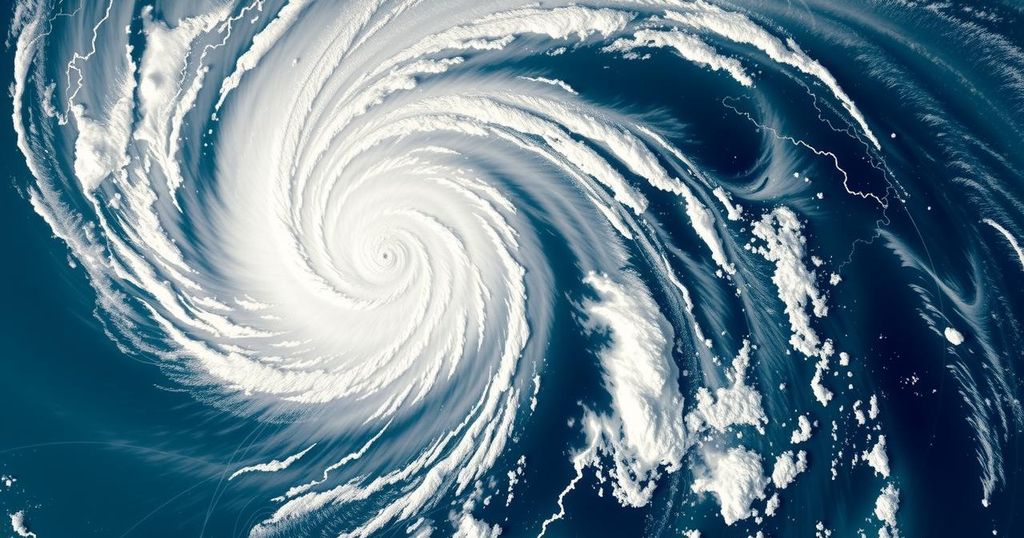Tropical Cyclone Chido Causes Devastation in Mayotte and Threatens Africa

Tropical Cyclone Chido has severely impacted Mayotte, causing extensive damage with wind speeds over 220 km/h. The French territory remains under red alert, while nearby regions prepare for the cyclone’s onward path towards Mozambique, potentially affecting millions. The ongoing cyclone season raises concerns about enhanced storm activities linked to climate change, emphasizing the need for robust disaster response strategies.
The French territory of Mayotte in the Indian Ocean has sustained significant damage due to Tropical Cyclone Chido, which is advancing toward eastern Africa. The storm produced winds exceeding 220 kilometers per hour, resulting in metal roofs being torn off buildings and extensive destruction across the islands, which have a populace of over 300,000. Fortunately, preliminary reports indicate no casualties. Mayotte Prefect Francois-Xavier Bieuville described Chido as the most severe cyclone to strike since 1934, urging residents to seek safety in robust shelters.
Despite the lifting of the highest alert to facilitate rescue operations, residents remain under a red alert and are advised to stay indoors. French Interior Minister Bruno Retailleau emphasized the extensive damages, revealing that local emergency services are fully engaged. Thousands of properties are reportedly without electricity, and numerous trees and structures have been dismantled by the cyclone’s fury. To bolster recovery efforts, additional rescuers and firefighters have been dispatched from France and Reunion.
The neighboring Comoros islands are also experiencing severe weather conditions, prompting authorities to issue a high alert in some regions. Local officials are concerned for the welfare of eleven fishermen who had ventured into the sea prior to the cyclone’s arrival. In response, the Comoros authorities have effectively immobilized maritime activities and closed the main airport and schools in preparation for the storm.
Forecasters indicate that Chido will continue on its eastward path, threatening Mozambique’s northern provinces of Cabo Delgado and Nampula. The Mozambican disaster management agency has warned that up to 2.5 million individuals may be at risk. Neighboring Malawi and Zimbabwe are also bracing for possible impacts, with authorities advising residents in prone areas to relocate to higher ground. Cyclone season in this region extends from December to March, with notable storms in recent years causing significant loss of life and property.
Cyclone Idai in 2019, for instance, resulted in over 1,300 fatalities across multiple countries, while Cyclone Freddy accounted for more than 1,000 deaths last year. The recurrent severe cyclonic activity exacerbates flooding and landslides and fosters conditions conducive to health crises, such as outbreaks of cholera, dengue fever, and malaria. Studies have attributed the intensification of cyclones to climate change, posing formidable humanitarian challenges for nations contributing minimal levels to the climate crisis.
Cyclones are severe weather phenomena that frequently affect regions in the Indian Ocean and parts of southern Africa, particularly during the December to March cyclone season. These storms pose a threat to infrastructure and human life due to their capacity to unleash destructive winds and heavy rainfall, leading to floods and landslides. In recent history, southern Africa has suffered devastating consequences from numerous cyclones, highlighting the growing concern over climate change and its impact on storm severity and frequency. Countries like Mozambique, Malawi, and Zimbabwe have been particularly vulnerable, facing humanitarian crises following major storms that have caused extensive destruction and loss of life. Accurate forecasting and preparedness are crucial for mitigating the adverse effects of such natural disasters.
In conclusion, Tropical Cyclone Chido has wrought havoc on Mayotte and threatens neighboring regions, notably Mozambique. With significant infrastructure damage reported and emergency services in full operational mode, local officials stress the importance of safety measures for residents. The impending impact on Mozambique and the ongoing challenges posed to Comoros, Malawi, and Zimbabwe underscore the urgent need for comprehensive disaster management strategies. This event serves as a poignant reminder of the increasing severity of cyclones attributed to climate change, necessitating global attention to support affected populations.
Original Source: www.voanews.com








